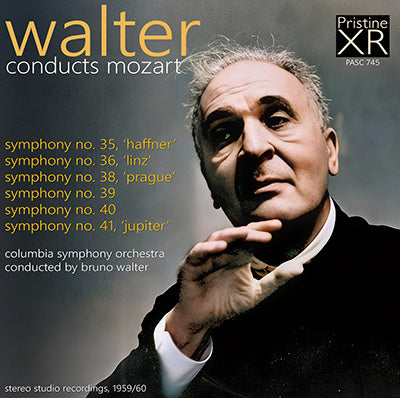
This album is included in the following sets:
This set contains the following albums:
- Producer's Note
- Full Track Listing
- Cover Art
In the twilight of a long and luminous career, Bruno Walter turned once more to the music that had illuminated his youth and accompanied his every creative step: the symphonies of Wolfgang Amadeus Mozart. These stereo recordings, made in 1959 and 1960 in Los Angeles with the specially assembled Columbia Symphony Orchestra, represent Walter’s final thoughts on Mozart’s last six symphonies. They stand not only as a magnificent musical achievement but as an enduring testament to the values Walter held dearest: warmth, humanity, serenity, and the expression of profound truth through simplicity.
By the time these recordings were made, Walter was in his eighties. A refugee from Nazi Germany, he had forged a second career in America, where he found peace, admiration, and the freedom to record extensively. The Columbia Symphony Orchestra, though nominally a studio ensemble, brought together some of the finest musicians in the area— the majority drawn from the Los Angeles Philharmonic, the rest from various Hollywood studio orchestras. It was with this hand-picked group that Walter made a series of stereo recordings for CBS that remain among the most cherished in the catalogue.
These interpretations of the final symphonies—Nos. 35 (Haffner), 36 (Linz), 38 (Prague), 39, 40, and 41 (Jupiter)—are the fruits of a lifetime’s reflection. Walter’s Mozart is neither scholarly reconstruction nor wilful romantic reinvention. Instead, it is deeply felt, eloquently phrased, and guided always by a sense of inner necessity. Phrases breathe naturally; climaxes emerge as inevitable; transitions flow with lyrical ease. There is no hurry, no affectation—only a kind of spiritual candour that comes from long familiarity and profound love.
The Haffner Symphony, No. 35 in D major, begins the set with ceremonial brilliance. Commissioned for a Salzburg family celebration, it opens with a bustling Allegro con spirito that Walter shapes with rhythmic buoyancy and clarity. The slow movement glows with poised nobility, while the Minuet has a gentle lilt that never lapses into stiffness. The final Presto crackles with joyous exuberance.
In the Linz Symphony, No. 36 in C major, written in just four days, Walter finds a perfect blend of grandeur and grace. The slow introduction to the first movement builds with a majestic inevitability, leading to an Allegro of sunny good humour. The Andante flows like a gentle stream, unhurried and full of charm. The Minuet is courtly, while the finale bursts forth with rustic vitality.
Mozart’s Prague Symphony, No. 38 in D major, is cast in only three movements. Walter brings special attention to the weighty introduction and contrapuntal intricacies of the first movement, evoking a sense of unfolding drama. The slow movement is played with tender introspection, and the finale sparkles with wit and clarity, echoing the opera Don Giovanni, which Mozart would soon compose for the same city.
The Symphony No. 39 in E-flat major ushers in a final trilogy of works that Mozart composed in rapid succession during the summer of 1788. Walter gives this symphony a patrician dignity. The majestic introduction gives way to an Allegro that balances energy with poise. The Andante is radiant and mellow, shaped with effortless phrasing. The Minuet swings gracefully, with a bucolic Trio featuring an expressive clarinet solo. The finale, full of bustling cheer, rounds off the symphony with warm brilliance.
The Symphony in G minor, No. 40, perhaps the most emotionally charged of the six, receives a reading of deep inner concentration. Walter eschews Sturm und Drang dramatics in favour of restrained intensity and lyrical directness. The first movement sings with tragic resolve, while the Andante offers a plaintive counterbalance. The Minuet has a muscular elegance, and the finale unfolds with driving tension, carried by a forward momentum that never loses focus.
Finally, the Jupiter Symphony, No. 41 in C major, emerges in all its Olympian splendour. Walter avoids pomposity, preferring an approach that combines grandeur with lightness of touch. The first movement is full of clarity and élan, the slow movement beautifully poised and reflective. The Minuet dances with classical grace, and the concluding Molto Allegro is a marvel of contrapuntal mastery, shaped with architectural lucidity and joyful purpose.
These recordings, now lovingly remastered, allow us to hear Walter’s Mozart in newly vivid detail. The stereo soundstage captures both the intimacy and breadth of his vision. More than half a century on, their warmth and wisdom remain undimmed. They are not simply performances of Mozart—they are conversations with him, held across centuries by a musician whose spirit was always kindred to that of the composer he revered above all others.
WALTER Mozart: The Last Six Symphonies
disc one (78:38)
MOZART Symphony No.36 in C major, K.425, 'Linz'
1. 1st mvt. - Adagio - Allegro spiritoso (8:40)
2. 2nd mvt. - Andante (8:28)
3. 3rd mvt. - Menuetto (4:19)
4. 4th mvt. - Presto (5:54)
Recorded 28-29 February, 1960
MOZART Symphony No.38 in D major, K.504, 'Prague'
5. 1st mvt. - Adagio - Allegro (10:54)
6. 2nd mvt. - Andante (9:04)
7. 3rd mvt. - Presto (4:25)
Recorded 2 December, 1959
MOZART Symphony No.39 in E-flat major, K.543
8. 1st mvt. - Adagio - Allegro (9:21)
9. 2nd mvt. - Andante con moto (9:15)
10. 3rd mvt. - Menuetto e Trio (4:01)
11. 4th mvt. - Allegro (4:18)
Recorded 20 & 23 February, 1960
disc two (75:38)
MOZART Symphony No.35 in D major, K.385, 'Haffner'
1. 1st mvt. - Allegro con spirito (6:00)
2. 2nd mvt. - Andante (5:18)
3. 3rd mvt. - Menuetto (3:51)
4. 4th mvt. - Presto (4:17)
Recorded 13, 16, 19, 21 January 1959
MOZART Symphony No.40 in G minor, K.550
5. 1st mvt. - Molto allegro (6:38)
6. 2nd mvt. - Andante (8:46)
7. 3rd mvt. - Menuetto (5:12)
8. 4th mvt. - Allegro assai (5:09)
Recorded 13, 16, 19, 21 January 1959
MOZART Symphony No.41 in C major, K.551, 'Jupiter'
9. 1st mvt. - Allegro vivace (8:52)
10. 2nd mvt. - Andante cantabile (9:09)
11. 3rd mvt. - Menuetto (5:11)
12. 4th mvt. - Molto Allegro (7:17)
Recorded 25, 26, 28, 29 February 1960
Columbia Symphony Orchestra
conducted by Bruno Walter
XR remastering by Andrew Rose
Cover artwork based on a photograph of Bruno Walter
Recorded at American Legion Hall, Hollywood, California, USA
Original recording producers: John McClure & Thomas Frost
Total duration: 2hr 34:16

